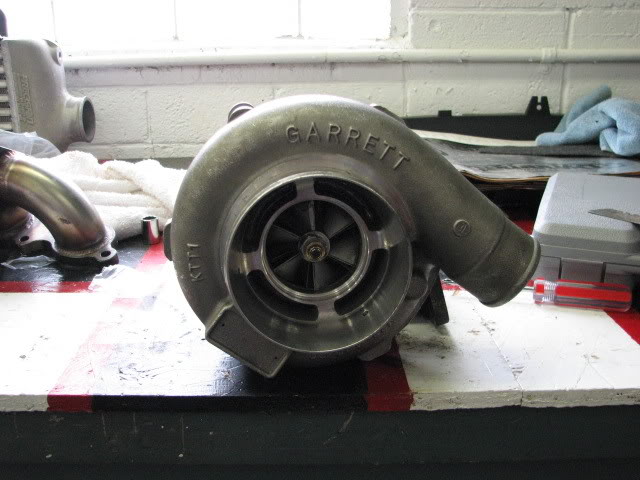Big Spool sound diffrence GT30R vs. GT35R
#12
#16
Registered User
Join Date: Oct 2006
Location: Melrose, MA
Posts: 598
Likes: 0
Received 0 Likes
on
0 Posts
the ball bearing turbos I've had in my Audi both have the sucking/screetching sound, not the traditional whistle sound of the journal bearing turbos. I had a GT28R, now a GT28RS. So my assumption is that the ball bearing turbos sound different than the journal bearing variety in the way that yo describe. I notice at low boost (13 psi) the sound is more like sucking while at 22 psi it gets a higher pitch to it.
#17
when i had a stock exhaust, i could hear the turbo slowly start to spool, and as it really spooled it sounded very nice, kind of like a internally wastegated turbo, but then the dumptube would open up.
Now the turbo spools much faster and the i hear the exhaust alot more! Since upping the boost, the turbo has completely changed its sound... much more visceral and manic. I will post some vids!
Now the turbo spools much faster and the i hear the exhaust alot more! Since upping the boost, the turbo has completely changed its sound... much more visceral and manic. I will post some vids!
#18
Originally Posted by weiRtech,Dec 4 2007, 09:09 AM
meh, i pick my turbo based on peformance matched to meet my goals, not how they sound.
IN THAT CASE EDUCATE ME ALREADY INSTEAD OF JUST SAYING DUMB COMMENTS!!!
I expected more from you Aaron.
But now your wondering why I know you name.
Did you ever get that flange for a SR20DET made?
J. R.
#19
Originally Posted by Ray K.,Dec 4 2007, 01:48 PM
the ball bearing turbos I've had in my Audi both have the sucking/screetching sound, not the traditional whistle sound of the journal bearing turbos. I had a GT28R, now a GT28RS. So my assumption is that the ball bearing turbos sound different than the journal bearing variety in the way that yo describe. I notice at low boost (13 psi) the sound is more like sucking while at 22 psi it gets a higher pitch to it.
Hmm...I wonder what that has to do with it.
While someone mentioned above its as easy as the rpm of wheels, but I think there is WAY more to it then that. I will explain my reasoning more once this thread matures a little more and we have some more info to work with.
I don't want to throw my theories out there just yet until I am sure about all the information out there.
J. R.
#20
Originally Posted by flexer,Dec 4 2007, 08:35 PM
While someone mentioned above its as easy as the rpm of wheels, but I think there is WAY more to it then that. I will explain my reasoning more once this thread matures a little more and we have some more info to work with.
I don't want to throw my theories out there just yet until I am sure about all the information out there.
I don't want to throw my theories out there just yet until I am sure about all the information out there.
The pitch of the sound coming from a turbocharger is just about completely dictated by the rotational speed. The faster it spins, the higher the pitch. Period.
A large turbocharger operating at low pressure will be spinning relatively slowly. The sound of fast moving air/wastegate noise, exhaust may far outweigh sound generated by the spinning turbo. A small turbocharger operating at high pressure will be spinning relatively quickly. This may come through as a very high pitched whistling.
Here's a wrench in the gears...
The upper limit of the audible range of human hearing is about 20,000 Hz or 20K cycles per second. If a turbocharger compressor wheel is comprised of 20 vanes, and the wheel is spinning at 120,000 RPM (which is 2,000 rotations per second), a blade will pass the compressor housing cut-water at a frequency of 40,000 Hz. That is, one single blade will pass the most restrictive part of the housing (the location of a massive pressure stagnation point and more than likely, a few shock waves) at a frequency of 40,000 times per second. Thats two times higher than our ears can distingish, therefore...we can't even hear it.






